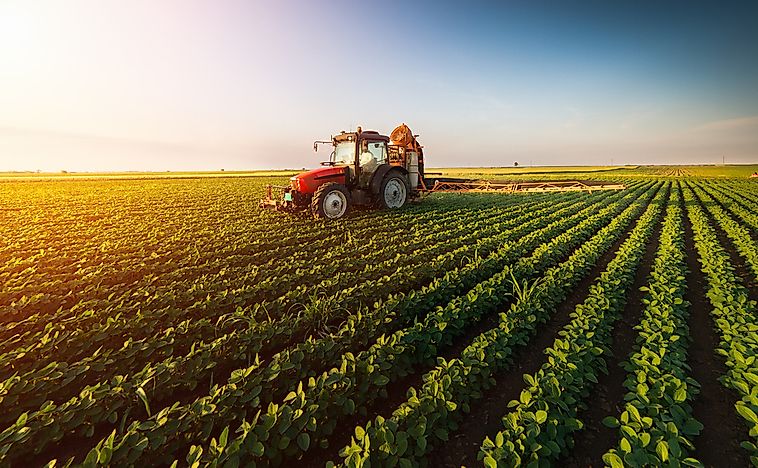Environmental Impact of Farming

Imagine waking up to a world where the air is crisp, the soil is rich, and the rivers flow clear and full—the quintessentially harmonious environment we often see in picture postcards. Now, picture those same landscapes marred by agricultural emissions, pesticides management left unchecked, and the ravaging effects of climate change impacts. Welcome to our present reality, where how farming affects the environment is more critical than ever. Let’s dive into the nuances of sustainable farming and explore solutions to mitigate the environmental impact of farming.
Understanding the Environmental Impact of Farming
Farming is the cornerstone of human civilization. However, the methods we use today are far from perfect. Overexploitation of resources, extensive use of pesticides, and excessive agricultural emissions are just a few ways farming negatively impacts the environment.
Soil Erosion: The Silent Killer
Soil erosion is one of the most insidious effects of modern farming practices. Each year, billions of tons of topsoil wash away, destroying delicate ecosystems and reducing the land's agricultural productivity. This phenomenon isn't new but has accelerated due to extensive plowing and monocropping. For example, the Dust Bowl in the 1930s—when poor farming practices combined with severe drought led to widespread soil erosion—illustrates the catastrophic consequences of mismanaging our soil.
So, what can we do to address soil erosion? Implementing methods such as crop rotation, cover cropping, and reduced tillage are effective strategies to combat soil erosion. For more on sustainable soil management, [[check out this guide]](https://www.un FAO.org).
Agricultural Emissions: The Climate Change Connection
Agriculture is a significant contributor to greenhouse gas emissions. Ranching, for example, produces methane, a potent greenhouse gas. Farming equipment powered by fossil fuels also contributes to emissions. While these sources are often overlooked, they play a substantial role in accelerating climate change impacts.
How can we tackle agricultural emissions? Developing renewable energy sources for farm machinery and optimizing livestock diets to reduce methane emissions are just a couple of solutions. If you’re curious about the innovations in this realm, take a look at this report by [[National Resources Defense Council]](https://www.nrdc.org).
The Dangers of Pesticides Management
The use of pesticides in farming, though it ensures bumper harvests, comes at an environmental cost. Excessive use of pesticides can contaminate soil and water, harming local ecosystems and endangering public health. Moreover, improper disposal of pesticide containers further exacerbates the problem.
How can we manage pesticides effectively? Integrating integrated pest management (IPM) practices, which combine biological, cultural, physical, and chemical tools in a way that minimizes economic, health, and environmental risks, is a sustainable alternative. The [[USDA's National Institute of Food and Agriculture]](http://www.nifa.usda.gov/) offers insights into successful IPM programs.
Embracing Sustainable Farming Practices
To mitigate how farming affects the environment, it's essential to adopt sustainable farming practices. These methods prioritize environmental health while ensuring agricultural productivity. But what exactly constitutes sustainable farming?
Crop Rotation and Polyculture: The Basics
Crop rotation and polyculture are foundational in sustainable farming. By rotating crops or planting multiple species together, farmers can prevent soil depletion, manage pests naturally, and enhance soil health. Think of it as diversifying an investment portfolio—spreading risk and ensuring stability.
Want to learn more about crop rotation and polyculture? The [[Rodale Institute]](https://rodaleinstitute.org/) is a fantastic resource for organic farming techniques.
Cover Cropping: Nature’s Mulch
Cover cropping is akin to giving your soil a cozy blanket. By planting green manure, farmers can retain soil moisture, suppress weeds, and improve soil structure. This practice not only boosts soil fertility but also helps in sequestering carbon, thereby mitigating climate change impacts.
To dive deeper into cover cropping, explore the resources available on the [[SARE (Sustainable Agriculture Research and Education) website]](https://www.sare.org/).
Reduced Tillage: The Gentle Touch
Traditional tilling practices may churn the soil, leading to erosion and nutrient loss. Reduced tillage, or no-till farming, preserves soil structure and maintains moisture levels. This method also sequesters carbon, aiding in the battle against climate change.
Interested in reducing tillage? The [[No-Till Farmer]](https://www.no-tillfarmer.com/) website offers comprehensive guides and real-life success stories.
The Future of Farming
Imagine a future where every farm is a lush, biodiverse ecosystem teeming with life. This future is within reach. By embracing sustainable farming practices, we can turn the tide on soil erosion, reduce agricultural emissions, and manage pesticides responsibly.
You might feel overwhelmed, thinking, “How can I, an individual farmer or consumer, make a difference?” The truth is, you can. By adopting even one sustainable practice, you contribute to a larger, environmentally conscious movement. So, let’s dive in together and explore how we can minimize how farming affects the environment for a brighter, greener future.
Dive deeper into the world of sustainable farming today and discover how you can make a difference. Read more and take action now by clicking here.
Frequently Asked Questions
What are the main environmental impacts of farming?
Farming affects the environment through soil erosion, agricultural emissions, and pesticide management. These factors contribute to environmental degradation, climate change, and loss of biodiversity.
How does soil erosion impact farming?
Soil erosion can reduce soil fertility, making it harder for crops to grow. This results in decreased agricultural productivity and higher costs for farmers.
What are sustainable farming practices?
Sustainable farming practices include crop rotation, polyculture, cover cropping, and reduced tillage. These methods aim to maintain soil health, manage pests naturally, and reduce environmental impact.
How do agricultural emissions contribute to climate change?
Agricultural emissions, mainly from livestock and machinery, release greenhouse gases like methane and carbon dioxide into the atmosphere. These gases trap heat, leading to global warming and climate change impacts.
How can we manage pesticides responsibly?
Integrated pest management (IPM) is a sustainable approach to managing pesticides. It combines biological, cultural, physical, and chemical tools to minimize environmental impact and economic risk.
```
0 Response to "Environmental Impact of Farming"
Post a Comment